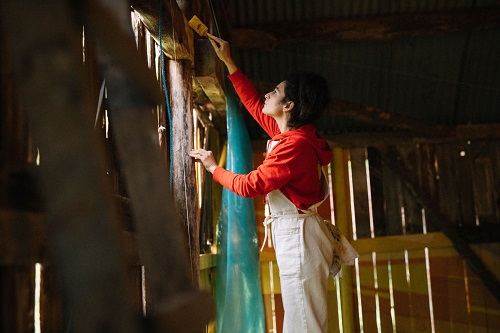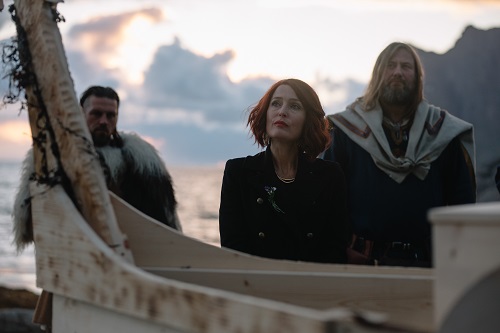Review: Jenny Slate’s Latest Indie ‘The Sunlit Night’ is a Disappointingly Generic Story That Barely Explores Artistic Freedom
In January 2019, to promote her latest indie film The Sunlit Night at Sundance, actress and producer Jenny Slate gave an interview with the excellent Rachel Handler from Vulture in which she spoke precisely and glowingly about the experience of making the film with Rebecca Dinerstein, who adapted her own novel for the project. Affectionately calling Dinerstein "Becky," Slate said of her experience, "Every time we would go to the Arctic, I'd be like, Whoa, I recognize nothing here except for myself. Which is pretty illuminating." I bristled at some other statements Slate made in the interview (like her insults toward documentary Free Solo, a movie I adored and I think actually syncs up quite a lot with what Slate was saying about the solitary nature of Arctic Norway), but made a note to seek out the film when it came out. Surely a movie that Slate was so moved by crafting would be moving for audiences to watch, too!
Imagine my disappointment now after viewing The Sunlit Night, a story comprising so many overly familiar "find yourself in a foreign country" components as to be utterly generic. Dinerstein's script mocks the highly fickle art world and underscores how it undervalues artists, but then doesn't offer enough development for its characters to explain why anyone would willingly plunge into such criticism. Everyone here is under-sketched, reduced to various stereotypes--disappointed dad, cranky genius, eccentric expat--and their motivations or guiding principles are mostly unexplored. And although Slate should be commended for working against her normal type, her subdued performance isn't enough to carry a film that seems unclear about anything it wants to say about art, about love, or about life.
The Sunlit Night begins with a panel of three (we're never told if they're teachers, mentors, judges, critics, whatever) who are tearing apart a painting. They use words like "lazy," "pedestrian," and "hotel art," and say it lacks complexity and "is leaving me cold," and one of them huffingly concludes, "I don't know anything about the artist." Director David Wnendt frames them like a firing squad, and then cuts to Frances (Slate), the young artist whose work they're eviscerating. She laughs a little when saying, "No, I don't have any questions, thank you," before bolting out the door. Frances avoids confrontation, and so we don't see her and her boyfriend's breakup, or how she tells her parents and her younger sister--all four of them cramped together in a one-bedroom Manhattan apartment--that she didn't get a Tokyo art residency for which she had been so hopeful.

Instead, on her own and without consulting anyone, Frances takes a summer apprenticeship in Lofoten, Norway, with reclusive painter Nils Auermann (Fridjov Sáheim). "Maybe I'm not an artist. Maybe I'm just the daughter of two other artists," Frances had worried, sharing her concern with us through first-person narration, and perhaps the time in Norway will do her good. The work will be mindless: Helping Nils paint a barn, both inside and outside, in a highly complicated organization of colors and line work. Frances calls it practically paint by numbers, and the way that Nils micromanages her isn't helping. He demands 12 hours of work a day; she doesn't speak Norwegian and can't navigate the local grocery store; and they're in the middle of nowhere, high in the Arctic Circle, with sunlight shining every hour of every day. If Frances wanted to disappear, she found the place to do so.
"Maybe success isn't really an option for any of us," Frances had mused of her parents--her father, a prolific medical illustrator; her mother, a textile designer for wealthy families--and of their dire financial conditions. And so Dinerstein's script, through that first-person narration, and Wnendt's direction, with its numerous references to famous artwork by the likes of Vincent van Gogh, Piet Mondrian, and Michelangelo Merisi da Caravaggio, is trying to figure out a different way of defining success aside from money. Is it finding yourself? Being accepted into a community? Forging an artistic partnership? Falling in love? All of those things happen in The Sunlit Night, but the narrative is so rote and predictable that it's hard to be engaged with any of it.

Nils is a jerk, but you can guess he probably won't be a jerk the whole time. A mysterious hitch hiker appears in the Viking Village where Nils and Frances are working on the barn, and Frances is convinced she's met him before, and you can assume the friendship she strikes up with the young man named Yasha (Alex Sharp) will eventually lead to something else. Frances's parents are separated, and her father hates her younger sister's fiancé, but this movie isn't really the kind to commit to familial strife. Zach Galifianakis and Gillian Anderson are here for little more than cameos, playing capital-C Characters. I do not know who asked Anderson to do a Russian accent the way she does one in The Sunlit Night, but they made a dire mistake, and I say this as someone who normally thinks Anderson can do no wrong!
All the parts are assembled for narrative tension, but it never materializes in a meaningful way. And the biggest barrier to any sort of emotional entanglement from us as viewers is the fact that Slate's Frances seems to lack any sort of interiority: Although we hear about her concerns of failure through that narration, we don't get anything else from her. What inspires her as an artist? A few repetitive shots of Frances wearing a black turtleneck, frowning at a canvas, making the exact same brush strokes of variously colored paints, aren't enough to communicate that to us. What drives her? What emotions does she want to communicate? What thrills her? What disappoints her? Put aside her frustrations as an artist: As a person, what does Frances value?
There is such lackluster flatness to this character that Slate, even switching things up with a more downshifted performance, can't quite make it work. The film mines its humor from Frances's bemused acceptance of other people's low expectations of her (when both of her parents assume she got dumped by her boyfriend instead of doing the dumping, she deadpans, "Why is that the assumption here, with both of you, right away?"), wacky small-town hijinks (a goat who always makes its way into Frances's trailer and whom she can't corral), and Nils's rudeness (how he puts a cassette in and cranks the stereo up when Frances tries to talk to him about art), but those aren't the kind of gags that last. The film's humor, like its characterizations of and observations about creative desire, familial expectations, and personal disappointment, are primarily superficial. The best thing about The Sunlit Night might be an Elliott Smith needle drop early on in the film. Aside from that thoughtful use of "Pretty (Ugly Before)," well, there isn't much.
The Sunlit Night is available on VOD through your cable provider and for digital rental/purchase through various platforms, including iTunes and Redbox.
![Forest Essentials [CPV] WW](https://s3-us-west-2.amazonaws.com/pcw-uploads/logos/forest-essentials-promo-codes-coupons.png)
0 comments